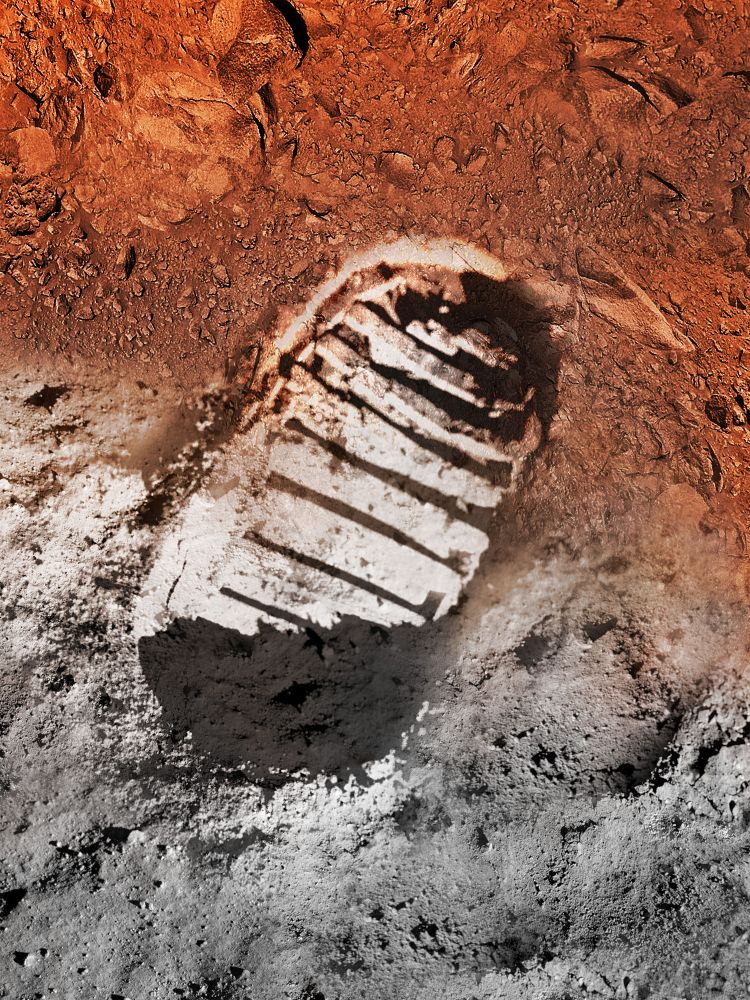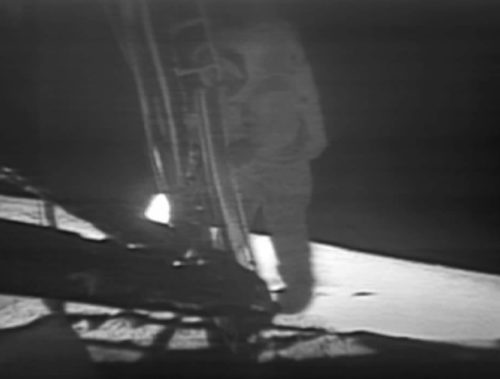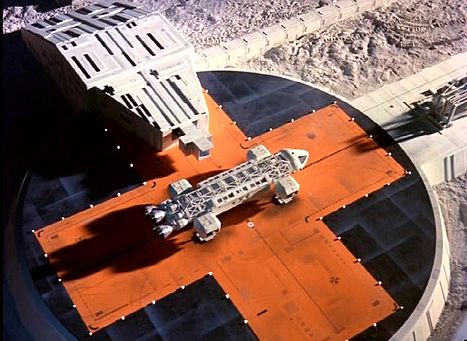
“We are not made wise by the recollections of the past,
but by our responsibility for the future.”
— George Bernard Shaw
The date is 16 July 2014 and the preparations for the celebration of the upcoming Apollo 11 anniversary are in full swing on NASA’s Moon base Artemis, as well as on the various complexes that have been built on the lunar surface by private space companies in recent years. Thirty-three thousand miles above them, on the Earth-Moon L2 Lagrange point, the Expedition 50 crew of the International Lunar Gateway Station is in the middle of its own preparations for the arrival of the next-generation Nautilus-X hardware and Bigelow crew habitats that will be part of the massive Prometheus spacecraft currently being assembled there, which will propel the first humans ever beyond the asteroid belt, for NASA’s long-awaited manned flyby of Jupiter. There are high hopes that the mission will be able to launch on time, so as to commemorate the 50th anniversary of the Apollo 11 mission and the 20th anniversary of the first manned landing on Mars. Meanwhile, on the Martian base Ares, a team of engineers from NASA and the private space industry are giving the final touches on the local in-situ resource utilisation hardware that will be responsible for filling up the orbital fuel depots with the necessary propellant that will return Prometheus home, following its long journey toward the outer Solar System.

The paragraph above may read like science fiction today, but for anyone growing up during the 1960s this was the vision of a future that seemed imminent. And how could it not be? By the time Apollo 11 had launched the first humans to ever walk on the Moon, 45 years ago this week, NASA was already considering the U.S.’s next steps in space which included a manned landing on Mars that was scheduled for no later than the mid-1980s. And just a year before Neil Armstrong’s “small step” on the lunar surface, the seminal 2001: A Space Odyssey dazzled audiences everywhere, by presenting what was widely perceived at the time as the shape of things to come.
Forty-five years after those heady days in July 1969, we live in a very different, much more introspective and Earth-bound world. NASA’s ambitious plans that called for the creation of a human base on the Moon and trips to Mars were cancelled and put on hold indefinitely, while the (frustratingly slow) exploration of the Solar System was left solely to robots. Today, Mars seems more distant and difficult to reach than what it was in 1969 during the peak of the Apollo program, while on a more basic level NASA currently lacks the capability to even launch anyone in low-Earth orbit, let alone the Moon or Mars.
Despite this disheartening state of affairs, there has been much optimism lately within the space community that a golden age of space exploration still lies ahead. Private companies have been making great strides in recent years by recovering the capability to launch cargo (and eventually crew within the next couple of years) to the International Space Station, a capability that carries with it the promise of a greater, more permanent, and sustainable human presence in low-Earth orbit, through the commercialization of human access to space. In the meantime, NASA hopes to restart manned deep-space exploration after more than four decades of low-Earth orbit activities by developing its next-generation heavy-lift launch vehicle called the Space Launch System and the Orion spacecraft. Could this resurgence of space activities finally lead to a new golden era of space exploration?
Political leadership: An imperative, or just a prerogative for U.S. space achievement?
One man who thinks that could be the case is Dr. Buzz Aldrin, legendary lunar module pilot of the Apollo 11 mission and the second man to walk on the Moon on 20 July 1969. A true icon of human accomplishment, Aldrin has long been an advocate of a robust U.S. human space exploration program and of Mars colonisation in particular. In order to commemorate the upcoming 45th anniversary of the Apollo 11 mission, Aldrin launched a social media campaign on July 8, called #Apollo45, inviting people all over the world to send their own videos via Facebook, Twitter, YouTube, and Google+, describing where they were during the first manned landing on the Moon, or how this monumental event inspired them and affected their lives.“I consider myself a global statesman for space, so I spend most of my time travelling the country and the world, to remind people what NASA and our space program has accomplished and what is still in our future at Mars,” explains Aldrin in the introductory video of his social media campaign on Youtube. “I feel we need to remind the world about the Apollo missions and that we can still do impossible things.” As part of his space advocacy efforts, Aldrin called for the next U.S. president who will succeed President Obama in 2016 to announce a new space exploration initiative that will commit the U.S. to sending people on Mars within the next two decades. “These anniversaries mean a lot to me, especially with the 50th anniversary coming up with a new president,” said Aldrin during a recent interview with NBC News. “That individual, that president, has a potential of going down in history more than almost anyone who has lived on the planet Earth, by committing human beings to an international, American-led permanence on the planet Mars.”
Video Credit: Buzz Aldrin Enterprises, LLC
Aldrin’s call has a definite feeling of déjà vu. On July 20, 1989, during the 20th anniversary of Apollo 11, he had stood alongside his Apollo 11 crewmates Mike Collins and the late Neil Armstrong, when the then-U.S. President George H. W. Bush announced his Space Exploration Initiative, or SEI, atop the steps of the National Air and Space Museum in Washington, D.C., directing NASA to return humans to the Moon and continue on to Mars, by the year 2019. Unfortunately, SEI’s fate was sealed right from the start, with Congress balking at the initiative’s $500 billion-dollar price tag. A similar announcement by President George W. Bush in 2004, better known as the Vision for Space Exploration, or VSE, didn’t fare much better and was eventually cancelled by the succeeding Obama administration in 2009, on the grounds of its pressing financial and technical problems.
Could a new presidential initiative as envisioned by Aldrin result in a meaningful path forward for the U.S. human space program allowing for a manned mission to Mars, in the same way that President Kennedy’s commitment for the Moon in 1961 resulted in the Apollo 11 Moon landing just eight years later? That would depend on the reasons for which such an initiative would be announced in the first place, within the context of the geopolitical and economic climate of its time. “There may be no way to send humans to Mars in the comparatively near future—despite the fact that it is entirely within our technological capability,” wrote American astronomer Carl Sagan in his book Pale Blue Dot: A Vision of the Human Future in Space. “Governments do not spend these vast sums just for science, or merely to explore. They need another purpose, and it must make real political sense.” Seen in this light, Kennedy’s 1961 mandate to NASA to send people to the Moon before the end of the decade served a real geopolitical purpose of trying to secure the U.S.’s dominance over the Soviet Union in the Cold War arena. When Armstrong’s and Aldrin’s first steps on the lunar surface achieved that goal, the Apollo program wound down and was eventually discontinued, without succeeding in creating a permanent human presence on the Moon or the rest of cislunar space, as envisioned by most space advocates at the time.

For space historian Roger Launius and space policy expert Howard McCurdy, over reliance on presidential leadership has helped to create false and unrealistic expectations about the future path of the U.S. space program. “Most space supporters did not understand how truly exceptional the Apollo mandate was,” they argue in their book Spaceflight and the Myth of Presidential Leadership. “After the glamor of Kennedy’s moment dimmed, space policy came to rest alongside all the other priorities of government, for which presidential leadership played a diminishing role. This eventually disappointed those who believed in the power of presidents to make space exploration special. The Apollo decision was therefore, an anomaly in the history of the space program.” That view isn’t shared by many, who see the absence of national leadership in space as the biggest cause for NASA’s perceived detriment in the post-Apollo era. “The first law of bureaucracy is to guarantee its own continuance,” wrote Sagan. “Left to its own devices, without clear instructions from above, NASA gradually devolved into a program that would maintain profits, jobs, and perquisites. Pork-barrel politics, with Congress playing a leading role, became an increasingly powerful force in the design and execution of missions and long-term goals. The bureaucracy ossified. NASA lost its way.” A series of studies on the state of NASA’s human spaceflight program that have been conducted during the last few decades have reached a similar conclusion, by acknowledging that without a stable, long-term continuous political and financial support by Congress and the White House, and a consistent, clearly defined space policy, NASA’s deep space aspirations for sending humans back to the Moon and on to Mars will remain unrealised indefinitely. That fact became painfully obvious when the George W. Bush administration failed to properly support its own Vision for Space Exploration, leading to its later cancellation by the Obama administration. Furthermore, President Obama’s passionate rhetoric toward the Apollo 11 crew during the White House 40th anniversary of the Apollo 11 Moon landing in 2009 was indicative of the attitude of most U.S. presidents, who treat these anniversaries as just PR opportunities for their own political gain, delivering grand speeches of support for the space program while silently go on to de-fund it.
Would then a new national mandate for sending astronauts to deep space destinations hold more water than the previous ones? According to American astrophysicist Dr. Neil deGrasse Tyson, in order for such a mandate to be successful it would have to satisfy either one of the two drivers he considers as being the most important for the successful outcome of any kind of huge and expensive long-term projects: military and economic. “[Kennedy] could have said: ‘Let’s go to the Moon: what a marvelous place to explore!’,” said Tyson during a past interview for Rationally Speaking.“But that’s not enough to get Congress to write the check. At some point, somebody’s got to write a check … Science alone has never been a driver of expensive projects. Below a certain level, depending on the wealth of a nation, money can be spent on science without heavy debate … Raise the cost of a project above $20 billion or $30 billion and if there’s not a weapon at the other end, or you won’t see the face of God, or oil wells aren’t to be found, it risks not getting funded … Unless we’re going to believe we’re a fundamentally different kind of population and culture than those that have preceded us for the past five thousand years, I’m going to take my cue from the history of major funded projects and say that if we want to go to Mars, we’d better find either an economic driver, or a military driver for it.”

A great number of space advocates, disillusioned with this chronic lack of leadership by the U.S. government to fund and execute an outward-moving and meaningful human space exploration program, tend to view NASA as being largely irrelevant, while placing their hopes at the hands of the private space industry instead. The private space sector has, without a doubt, seen a tremendous growth during the last decade, while also taking on all the low-Earth orbit transportation activities that were historically the domain of NASA. All this activity has created an impression among space enthusiasts and the general public alike, that a free-to-innovate private space sector unconstrained by the trappings of a slow and bureaucratic government can take on the challenge of deep-space exploration alone, and that the first human expeditions to the Moon and Mars are just a few years away. A past AmericaSpace article had taken a critical look at these assertions, by arguing that these ambitious announcements by various private space companies which call for the massive, fast, and affordable colonisation of Mars, starting in just a few years, conflict with the reality of the great financial and engineering challenges that these aspirations entail.
Furthermore, many of these companies tend to announce highly ambitious deep space goals which are often perceived by the public as a done deal, without many times having demonstrated even a basic spaceflight capability. “[These companies] cheer and proclaim the advent of a new era in spaceflight, but their launch manifests don’t begin to match the pace and predictability of their press releases,” comments Dr. Paul Spudis, a senior staff scientist at the Lunar and Planetary Institute in Houston, Texas, and a long-time advocate of human space exploration, in his blog Spudis Lunar Resources. “Their endless demands to re-direct shrinking NASA funds to them, belies their proclamation of being either ‘new’ or ‘commercial’ … Got a wild idea for a space mission? You say you want to build a vacation resort on Jupiter? Hold a press conference and you’ll have instant credibility as a space ‘entrepreneur’. As for any skeptics in the audience – just ignore them or label them ‘dinosaurs’, ‘old space fossils’, ‘cold-war warriors’, ‘senile’, or shills for government space ‘pork’. Got a difficult question for the space entrepreneur? There’s the exit. Don’t let the door hit you on the way out.”
Far from trying to provide any answers to the issues raised, this article has tried to examine some of the reasons behind the mismatch between the dreams of space advocates during and after the Apollo program, and the underlying political realities that dictated its rise and eventual demise in the first place. The upcoming 45th anniversary of the Apollo 11 mission, besides being a cause for celebration of past achievements, is also an opportunity for contemplation on these issues, which in the end will play a huge role on shaping our future in space and the kind of role we would likely have in it. Does that mean that our future in space (if there will be any at all) will be entirely dependent on the whims of Congress and the White House? “If you ask me, If I were head of NASA and I get the chromes that the nation handed me, how would I spend it, to prioritize [NASA’s human spaceflight program] and make it exciting, I’d answer ‘no, it’s the wrong question!” argued Tyson during his launch keynote address at the 28th National Space Symposium in Colorado Springs, in 2012. “That’s asking for handouts. That’s just trying to make NASA a vanity project for engineers. That’s the wrong attitude. It’s the wrong understanding of [NASA’s] role in our society. So, I don’t want to lead anything. I want to convince the public that the right NASA budget will get us out of [the current] economic doldrums, because at the end of the day it’s not what the President feels like, or Congress feels like, it’s what we feel like doing, because the President works for us.”
Buzz Aldrin’s social media campaign serves as a reminder that humans are a curious, exploratory species. Yet these exploratory urges have consistently clashed with the political and economic factors that have plagued the U.S. space program since its inception and the real motives for which it was funded in the first place. Still, if the public’s opinion of the U.S. human space program is the most decisive factor for its future, as Tyson argues, then what are the public’s views and beliefs about man’s greatest adventure and how can these affect its course? Seen in this light, will the public celebrate the upcoming 45th anniversary of the Apollo 11 mission as just another historical event, ever-receding further into the past, or as a source of inspiration for future achievements in space?
Video Credit: Space Foundation
You can read Part 2, here.
Want to keep up-to-date with all things space? Be sure to “Like” AmericaSpace on Facebook and follow us on Twitter: @AmericaSpace




The real truth is it was a shame we gave up on Apollo. If we had kept going back we would already have a Moon base from which to work with! Instead America is fumbling around just trying to get into orbit. Russia has just stayed in orbit and done nothing new in how many years. They are stagnated as well. Whether China progresses remains to be seen and their space program is probably aimed for military purposes. Everyone keeps saying our space program has no defined goal. If I were Pres, I would give it an important goal. With our need for energy on the ever increase and cost going up and up, we should build a solar power plant to give us all the limitless energy we can ever hope for. Certainly it would be a project as big as going to Mars. A Mars mission would be probably more of an exciting undertaking, but a one or two time spin around the red planet really accomplishes not much. A return on solar energy however would gain so much.
The truth is We are prisoners on this planet for the advantage of a very few indeed…They understand what happened by colonizing the NEW WORLD and the subsequent American Revolution meant that a bunch of wealth was lost…Clearly they won’t allow that to happen again…The fact that we have 5 Billion people on this planet whose annual wage is less than the average Mexican illustrates just how ruthless the Elite are that run this planet…The success that SpaceX is having is not surprising considering just how mature this technology is…Interesting in how Musk describes the amount of corruption is involved in the space industry as they operate very much like the mob in “protecting their turf”…When you have to go down to the fifth subcontractor to find anyone that actually cuts metal you begin to really see how the political group does not allow the free market in space…As someone growing up in the 60s…and watching this all happen makes me pretty disgusted with government space programs…The idea of NASA going to Mars with a manned crew truely seems like …Science Fiction
The glory days are done, period. Why? The ignorance of the American public, pure and simple. Just look at television, the internet and the newspapera and you will see what’s really important to the majority of our fellow Americans. Even among space advocates, there is division. History is recording our mediocrity. It is sad to write this and I wish it was otherwise but it will take a miracle for this situation to change.
Just a note, that this is not the Joe that has been posting here, that is me.
An observation from myself regarding Apollo. If the Apollo 13 in-flight explosion had not occurred, I think we would had not cancelled the last couple of landings. The administration in office became shocked at what a close call Apollo 13 was, and did not want a space disaster on their watch. They had other issues like ending the Vietnam War to contend with (I’m not even counting Watergate in this discussion), which was costing the USA many billions of dollars, along social programs and the NASA budget. To keep the Military Industrial Complex running in the wake of the reduction of Vietnam and to keep Americans working in those plants, something else had to happen by 1971-72. This was a reason why NASA promoted a Space Shuttle, to keep NASA jobs, to keep the aerospace industry going, on the idea of a ‘cheap’ reusable spacecraft with a short turnaround. We know the final result of that, written in other blogs and columns here and elsewhere. We will get back our USA human presence on USA made spacecraft, like Orion, Dragon II, Dream Chasers, etc. We need to shift our priorities from war, to peace like the Moon and Mars.
I could make a very good argument that it was the Apollo 1 Fire that killed our space program, because it was so shocking that it left us afraid to take real risks. We went to the Moon because we were pledged to, and went back several times to show it wasn’t a one-off stunt, but as soon as it was politically feasible to do so, we shut it down and retreated to Low Earth Orbit, where we’ve gone in circles for the past four decades, shambling round and round like a zombie.
But there are a lot of people who’ll take umbrage at such an assertion, who’ll claim that publicly espousing such a position is tantamount to saying the Apollo 1 astronauts died for nothing, that it’s spitting on their graves to say so. So when I set forth that position in my short novel A Separate War, set in a world where the Apollo 1 astronauts narrowly escaped, I was careful to present that idea as the opinion of one character, and the only hint to my own position on the matter is how Santini never challenges Andersen’s assessment of the consequences of a fatal Fire, only says that he’s experiencing survivor guilt and mustn’t blame himself for what happens in the other world.
A counter point to Gary W. If Apollo 13 had succeeded in its primary mission, then Apollo may have ended much earlier. The public’s apathy towards the program was already evident by the time 13 launched. The near disaster galvanized public interest and may have extended the program to A-17.
Mike D
While Apollo was a thrilling achievement, to anyone paying attention, it demonstrated how not to run a space program. Von Braun may be the only reason it succeeded because he over engineered the launch vehicles. If he hadn’t it might have taken another decade to reach the moon and we would have lost the race. A race that should have been about making profit rather than beating the Ruskies.
Letting Russia trumpet a win while breaking their bank trying to keep ahead might have accomplished what Reagan did decades sooner?
Space exploration is not, despite Newspace wishful thinking, only about turning a profit. What profit was generated from Explorer, Mariner, Pioneer, Voyager, Galileo, Cassini, Viking, Pathfinder, Phoenix, Spirit, Opportunity, Curiosity, Juno, New Horizons . . . I guess that since they did not put “profit” in any pockets, what we learned because of these missions has no value. Since the administration cancelled Constellation and attempted to put NASA “on indefinite hold” pending the use of NASA funds for some future nebulous “education program”, every profit-hungry real estate mogul, pizza magnate, or internet billionaire is now a Von Braun with up a sure-thing money-making power-point presentation dreamed up while sipping champagne in his hot tub. Shepard, Glenn, Armstrong, Cernan, the crew of Apollo 1, the crew of Challenger, and the crew of Columbia did not do what they did for profit.
Purely scientific missions do not have to have a commercial basis. But NASA’s commercial cargo program has shown 90% can be cut from the development cost of both launchers and spacecraft by following the commercial space approach.
This would make previously unaffordable manned missions, affordable.
Bob Clark
“NASA’s commercial cargo program has shown 90% can be cut from the development cost of both launchers and spacecraft”
NASA’s commercial cargo program has also shown that those same spacecraft may have a hard time fulfilling the mission for which they were developed.
Thus NASA having to extend the contract periods on CRS for both SpaceX and Orbital Sciences by two years in order for them to be able to try to meet the delivery terms of the contracts.
http://www.spacenews.com/article/civil-space/40059nasa-says-it-will-extend-private-iss-cargo-delivery-contracts-through-2017
You get what you pay for.
This is an excellent analysis of the current situation and how we got here.
Mike M.
Obama has just made the East coast open to oil companies. More oceans to pollute I guess! Our space program needs direction. Instead of Mars or the Moon, why not build a huge solar power plant to feed energy to Earth instead? While a Mars or Moon mission would probably be more exciting, spending all that money for a few jaunts around the red planet really doesn’t accomplish much. We went to the Moon and then quit. If we had kept going we would quite probably have a permanent base there now and would not be bumming rides off Russia. Returns on a solar facility would be enormous and develop the necessary hardware for future visits to the Red Planet. The Earth only receives a very small percentage of the Suns output, and indeed we could power this world with some of it! Are the oil companies holding us back from this?
Obama probably isn’t going to be very enthusiastic about solar energy after his Solyndra debacle.